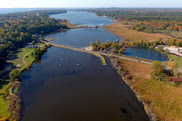|  Looking for new meal ideas this holiday season? Seafood has a lot of flavors to offer! Check out this short video for some meal-planning inspiration. |
|
Highlights The National Fish and Wildlife Foundation and NOAA today announced $4.1 million in grants to modernize fisheries data management systems and support the implementation of fisheries electronic monitoring and reporting projects in 14 states and Puerto Rico. The grants will generate $4.8 million in matching contributions for a total conservation impact of $8.9 million. |
 The National Fish and Wildlife Foundation today announced nearly $500,000 in investments to reduce threats to North Atlantic right whales and other marine life off the coast of New England. These critical investments include $427,000 in grants and $71,000 in grantee matching contributions. |
 Oyster aquaculture in the United States provides jobs in coastal communities, provides a sustainable source of seafood and can help improve ocean health by providing habitat for fish and improving water quality. But, COVID-19 and the resulting restaurant closures have led to a dramatic decrease in demand for farmed shellfish, leaving oyster farmers across the country struggling to market their products. |
|
|
West Coast Research scientist Sheila Thornton of Fisheries and Oceans Canada learned that she must have been within a stone’s throw of the tag. When she trained her tracking antenna on the water from a breakwater near the Vancouver airport, she saw it had passed by just 12 hours prior. |
 Coho salmon are returning to northeast Oregon’s Lostine River in record numbers almost five decades after they disappeared from the basin. The coho are once again supporting tribal harvest and a new Oregon recreational fishery. |
|
|
Greater Atlantic As dogfish populations recover from overfishing, questions remain about how much Atlantic cod they are eating and the impact on the struggling cod population. Innovative genetic techniques help shed some light on the situation. |
 For decades, Michigan’s Muskegon Lake was considered one of the most degraded areas in the Great Lakes region. NOAA and the Great Lakes Commission have partnered since 2008 to restore habitat and improve water quality in the area. With much of this work nearly finished, Muskegon Lake could soon be removed from the list of Great Lakes Areas of Concern. |
|
|
| |
|

No comments:
Post a Comment